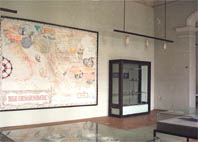|
After the liberation of Bulgaria from the
Byzantine yoke for a short period Varna was included into the Bulgaria
state by Czar Asen I in 1190. Soon after Byzantium conquered the
town again and it was the Bulgarian Czar Kalojan that finally liberated
the town and included it into Bulgaria.
Varna was again the main port of Northern
Bulgaria. Substantial was the invigoration of the economic life
during the last decades of the 13th century and the revival lasted
during the 14th century. The town spread in territory and around
the fortress living districts arose.
In 1366 the Bulgarian Czar Ivan Alexander
submitted Varna to the Dobrudja ruler Dobrotitsa who announced it
a capital of the Region.
Varna was a metropolitan center. Built were
churches with the characteristic for the 13th – 14th century ceramo-plastic
decorations. Exhibited is a detail from the façade of the ruined
St. George church, cornices and other stone ornaments decorated
with floral elements and fabulous animals.
The ceramics from that period – local and
imported is exhibited in one of the bigger showcases. Exceptional
with their aesthetic forms and style are the two sgraffito and relief
decorated jugs.
Exhibited here are inscriptions on stone in
Bulgarian and Greek language from the fortresses of Ovetch /Provadia/,
Maglizh /by the village of Aksakovo/ and the one by the village
of Nevsha.
|

